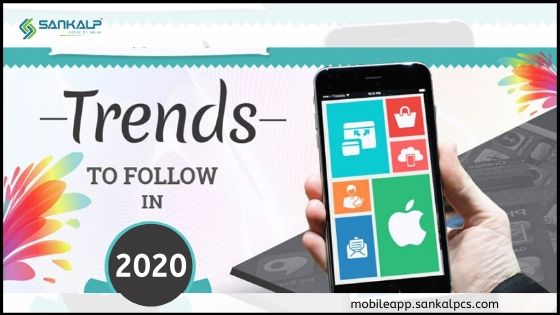The mobile app industry heads for a dynamic transformation with every passing year. In 2019, the process of developing mobile applications witnessed the integration of various technologies. Mobile app developers focused more on developing apps based on their targeted audience instead of sticking to the client’s needs.
Location-based technologies, asset tracking, cross-platform synchronization, and e-commerce were among the instrumental trends that shaped the business of mobile app development in the past year.
In 2020, the mobile industry is likely to witness a significant change in the nature of business requirements for mobile applications. By the end of the year, the global market for mobile applications is forecasted to reach a valuation of US$ 200 billion.

As every organization head towards integrating its business in a mobile app, the mobile application development process is bound to be influenced by a range of trends and technologies.
Top 15 Trends in Mobile Application Development for 2020
The following trends in mobile application development will play a key role in making your app stand out in the global marketplace.
1 EMM and APM
Every leading mobile app development company is increasing the integration of platforms that allow organizations to enable the mobile devices of their employees in a secure network. The Enterprise Mobility Management (EMM) platforms are experiencing a sharp uptake. EMM platforms offer a great advantage in streamlining business processes with mobile computing.
Application Performance Management (APM) platforms are also at the forefront when it comes to transforming app performance. For app testing and quality assurance, mobile application developers will become increasingly reliant on APM platforms.
2 Beacon Technology
Wireless transmitters, known as beacons, are the next-gen hardware technologies used in mobile devices. These beacons are primarily used for exchanging sales information in the retail sector. Beacon technology, when integrated with the Internet of Things, can offer location-oriented solutions for proximity marketing and physical access control. In a matter of months, new mobile devices are expected to be equipped with AI-enabled beacons and mobile payment beacons to facilitate new-age features such as beacon treasure hunting.
3 Wearable Technology
Currently, the market for wearable devices is witnessing positive growth. Consumers are expecting the integration of more technologies and functionalities in their wearable devices. There is also an apparent change in the acceptance of wearable devices. What was once considered as accessories to smartphones are now becoming their own line of standalone products. By the end of 2020, more than US$ 30 billion wearable devices are likely to be sold in the global mobile industry. Mobile applications designed specifically for such devices will enter the consumer landscape with a major noise.
4 Cloud Technology
For seamless functionalities, enterprises are deploying their mobile application development projects on cloud spaces. Tech giants such as Google and Microsoft are expanding their footprint in the domain of public cloud. To meet modern scalability needs, mobile applications of growing as well as established businesses are being developed with cloud-based computing resources. This is not only optimizing the mobile app development prices but also lowering the dependencies of mobile apps of limited data infrastructures.
5 Internet of Things (IoT)
In the US, a majority of households have modernized their homes into smart homes. Smart locks, automated temperature control, and authenticated security solutions are the future of home appliances. Mobile application development is growing in parallel with the connectivity of such devices.
The adoption of the Internet of Things (IoT) is rampant in the commercial and retail sectors. Business premises are already using mobile applications to allow or deny entry to users. In the market for premium real estate, the use of IoT-based applications built with iOS app development technologies is gaining traction. Remote access control will soon become a must-have feature in almost every real-life applications of mobile technologies.
6 5G Wireless Freedom
The super-fast 4G LTE network is soon to be replaced with ultra-fast 5G services. As the data volumes continue to increase, consumers will demand a network 100 times faster than the current feasible network. 5G wireless services shall be ushered in by mid-2020 or thereafter. Working at hyper-speeds, these 5G wireless services and networks will impact the processing threshold of mobile applications. Their data influx rate will mess up the current mobile apps, which is why every mobile app developer will incorporate new changes to its products after the launch of 5G wireless fidelity.
7 AI and ML
Google’s Duplex is a groundbreaking work of integrating Artificial Intelligence (AI) into the consumer lifestyles. Upcoming mobile applications will be developed with one or more AI technologies. Machine Learning (ML) will automate co-related and synchronous mobile processes. The set of ML tools used by a mobile application will determine its efficacy under critical performance scenarios.
8 AR and VR
Mobile disruption by Augmented Reality (AR) is the latest trend to impact the retail sector. The uptrend for AR devices in consumer retail will influence the behavior of buyers. Organizations would prefer building mobile applications that keep the majority of users engaged in their retail outlets. Virtual Reality (VR) advancements will also foment the dynamics of mobile app developments. VR in healthcare, marketing & advertising, and manufacturing will emerge as key technology stakeholders in the industry.
9 Integration of Mobile Wallets and Payment Gateways
Apple Pay and Google Wallet are now must-have integrations for mobile apps. Every company aims to abridge the transactional delay in purchases for its users. The integration of mobile wallets is thriving on the cusp of increasing reliance on online payment options. m-Commerce technologies are further supporting the integration of payment gateways, enabling users with peer-to-peer money transfer systems.
10 Mobile App Security
In Android app development, cybersecurity is a significant aspect. It overpowers the value of all other technological trends affecting the mobile app development process. In 2020, several mobile app developers will build applications in Objective-C language, allowing them to integrate advanced security technologies.
With extensive testing processes, deception technologies will be identified. Mobile app developers will also consider deploying their products in broken organizational networks to check for their resistance towards defiling activities. Organizations will upgrade their operations with Bring Your Own Device (BYOD) trends, for which new and enhanced mobile security apps will be put to use.
11 Blockchain
To facilitate the security advantages of blockchain technologies, most mobile developers may consider building decentralized mobile apps. Asset tokenization will be the latest addition to mobile app security. In addition to this, a new branch of business – BAAS (Blockchain-as-a-Service) – will enter the global mobile marketplace. Blockchain advancements in mobile app development will also help users trade securely with crypto-currency exchange. The volatile crypto space may become a bit subtle in 2020, while the gaming domain would witness a steep growth in transactional activities.
12 Bots
Chatbots were a key trend influencing the mobile app development market in 2019. This year, the rise of bots will be noticeable in the sectors of food delivery, food service, online shopping, and cab services. Bots will take care of rudimentary computing tasks. Mobile apps developed with bot integrations will have a competitive advantage, particularly for maximizing voice recognition and text-to-speech analysis technologies.
13 Accelerated Mobile Pages (AMP)
Google’s esteemed AMP project will continue to influence the scope of mobile application development in the field of search engine optimization. Accelerating web pages from mobile apps would become easier. At the same time, users would be able to create heavy websites and manage them seamlessly with mobile app development technologies. Integrated AMP listings in mobile apps will help developers lower the loading time and result in high performance across multiple mobile platforms.
14 Predictive Analytics
Facebook will continue to be the flagbearer in employing predictive analytics to its mobile application. Several other companies will join the social media behemoth in integrating data mining, statistical refactoring, and unstructured modeling techniques to their consumer databases. Mobile apps will become a key resource to generate high-value and business-critical data on consumers. It will welcome the latest achievements in data science and consumer behavior analysis.
15 Instant Apps
In 2020, mobile apps will become more compact and less heavy on the device hardware. They will be built with an aim to keep them smaller in size. Each mobile app will be developed with the functionalities of a website. The instances of using mobile apps will be increased by providing an excellent user experience (UX). The UX advantage will be supported by a super-friendly user interface (UI). And, the smooth cascading in the aspects of UI and UX of a mobile app will surely not have any overloading effect on the device memory.
Final Thoughts
Keeping these trends in mind, the mobile app industry will grow unstoppably in 2020. The competition among mobile app developers be even more fierce than the past year. Before building your app, partnering with the right mobile app developer will prove to be much more beneficial. The key to a successful mobile app development project in 2020 will certainly revolve around an optimized adherence to these trends.







Thanks for one’s marvelous posting! I really enjoyed reading it, you will be a great author. I will always bookmark your blog and may come back later on.
I want to encourage one to continue your great writing, have a nice
evening!
Like!! I blog quite often and I genuinely thank you for your information. The article has truly picked my interest.
[…] run a successful salon, you need to plan ahead and see what’s in trend. Mobile apps are a top trend in business technology. A salon business can become well-connected […]